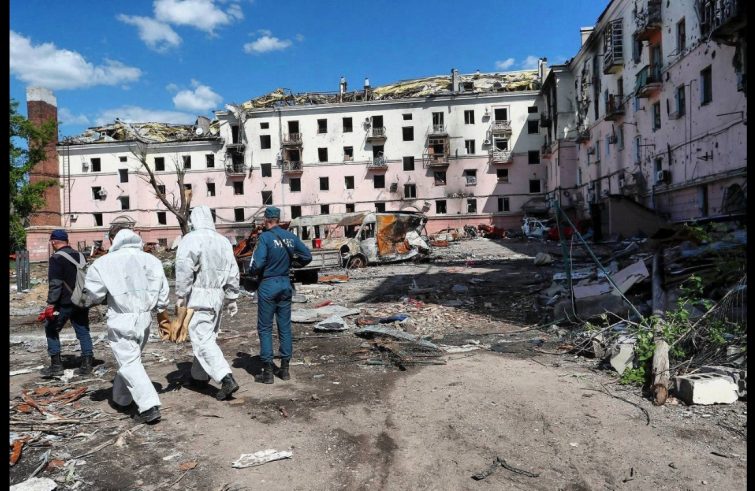
The municipality of Mariupol was the first to raise the alarm on Telegram. “Tens of thousands dead from cholera epidemic – unfortunately, this is a potentially real scenario for occupied Mariupol.” But the news is confused. Joining SIR by telephone to talk about the epidemic emergency in Ukraine as the summer season and heat approach is Fr. Oleh Ladnyuk, a Salesian priest from Dnipro, the capital of Dnipropetrovs’k Oblast, a region bordering the battered Donbas. “The cholera risk,” he says, “seems to be confined for now to the city of Mariupol where there appear to be still many dead bodies lying underneath the destroyed buildings. But we cannot confirm the news because there is no reliable and documented information. Ukrainians no longer have access to the city. The news was given by the mayor and deputy mayor who evidently have information from the people still there, but it is not official information. It has been learned that the Russians have brought specific medicines and have opened a hospital for infectious diseases in Rostov. But officially there is no definite news.”
On the Telegram post, the Mariupol municipality mentions a number of factors that can lead to an outbreak that is being described as “explosive.” “The central water supply and sewage system are not working.”
“The city is literally drowning in garbage and sewage.”
“Spontaneous burials are found in almost every backyard. The summer heat has accelerated the decomposition of thousands of corpses under the rubble. There is a lack of medicines and health facilities have been destroyed.” Finally, both the sea and the waterways are “constantly polluted with garbage, sewage and a flow ‘of corpses.'” What can save Mariupol?” the municipal administration writes. “The restoration of ‘green’ corridors and an international humanitarian mission involving total evacuation.”
The Salesian Father explains that unburied bodies heighten the risk of a cholera epidemic. “But the Russians do not allow this information to circulate,” so the information is yet to be verified. “The problem could occur in the completely destroyed cities where it is impossible to collect the corpses. However – the Salesian Father assures – the cities that have been liberated by the Ukrainians, have all been cleared. So the alert remains high for Russian-occupied cities. “Regarding the Donbas, the Ukrainians are attacking but they are also slowly retreating, about 2 kilometers a day.”
Mariupol overlooks the Azov Sea, and last week, temperatures increased up to 28 degrees. “It’s hot,” Fr. Oleh remarks. “In Severodonetsk, where heavy fighting is ongoing, there are very few people left, so there are no concerns of epidemics.” But in Mariupol the situation is different: the municipality estimates that more than 120,000 people are still in the city. There is a lack of food and drinking water. “That’s why cholera occurs: because the water is contaminated,” says the Salesian Father. “Mariupol unfortunately always experienced severe water shortages, and we knew that with the heat, the destruction, and the corpses there can be outbreak of these kinds of diseases .
A soldier told me that they have also started killing dogs and that even animal bodies were left lying in the fields. There is a very strong smell of corpses.”
Going back and forth to the cities of the Donbas region, the Salesians are still trying to convince people to evacuate but “the people who are still there do not want to leave and go the western part of the country. They don’t want to leave their homes.” The city of Dnipro is thus becoming a reception hub for internally displaced persons, mostly from the Donbas. But the more intense the fighting becomes, the more overcrowded the reception facilities become. Fr. Oleh says the Salesians are planning to build a few small houses here in Dnipro, or to ask European countries for prefabricated houses so people can stay safe while not being too far away from their homes. “Then there is the problem of bread,” the Salesian adds. “We went to the Lugansk region three days ago and people were mostly asking us for bread. They also ask for drugs to treat asthma, and insulin for diabetics. I had promised to bring this aid today but on the map I saw that that village is occupied by the Russians so I can’t enter anymore. We are used to it. Villages are constantly changing hands from Russians to Ukrainians and we hope to be able to return next week.”









